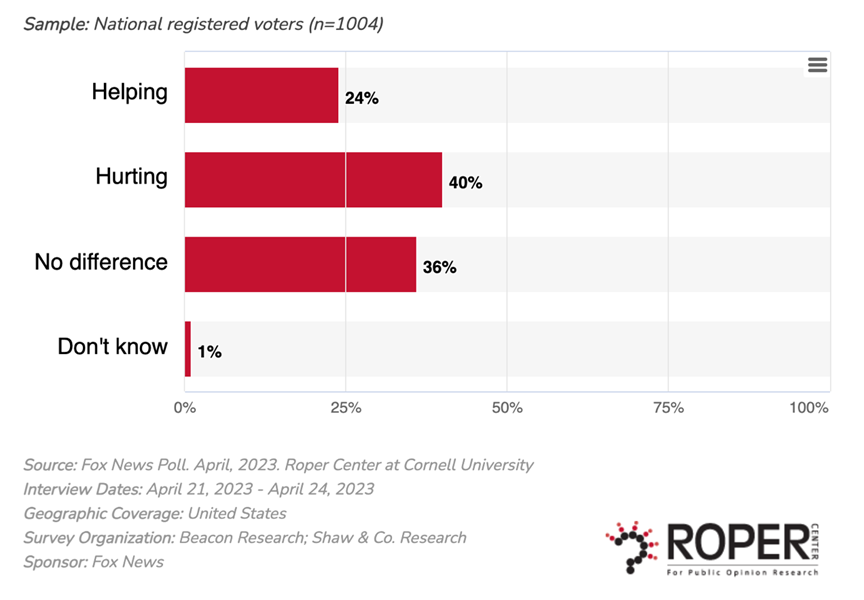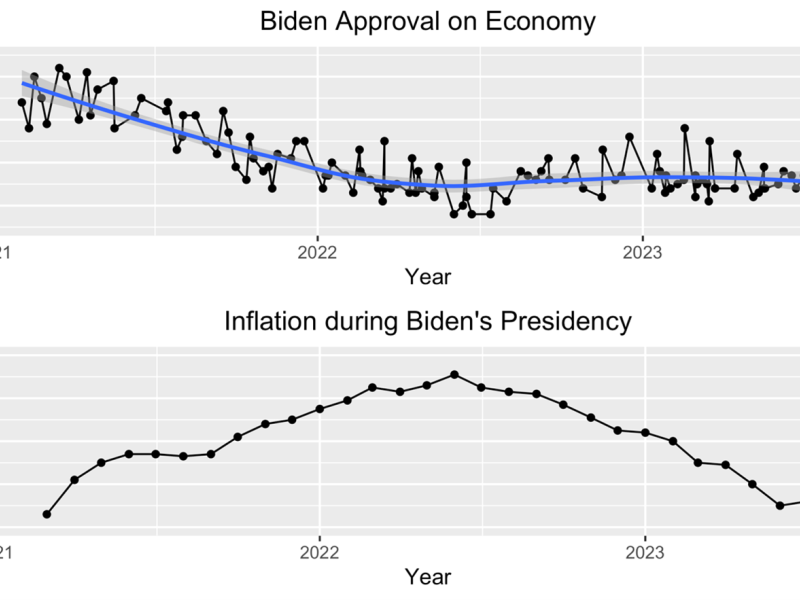September 2023
“Inflation Soared in June, Pinching Consumers and Challenging Policymakers,” read a New York Times headline about the June 2022 inflation report.[1] The report revealed an annual inflation rate of 9.1 percent, the highest level since the intense period of economic crisis in the 1970s and early 1980s. One of the policymakers faced with the enormous challenge of dealing with the inflation problem was President Biden. Biden’s approval rating on the economy hit its lowest level in June 2022. In a poll conducted by the Associated Press and NORC that month, only 28 percent of respondents approved of Biden’s handling of the economy while 69 percent disapproved.
In the year from June 2022 to June 2023, inflation gradually but consistently decreased from its peak of 9.1 percent to 3 percent (it has since ticked up slightly). Additionally, the unemployment rate has stayed below four percent. However, Biden’s economic approval rating has remained stubbornly low. His approval rating on the economy in the most recent poll available in the Roper Center database at the time of writing was still only 33 percent (A Reuters/IPSOS poll conducted in August of 2023).
Economic approval ratings, in which respondents are usually asked, “Do you approve or disapprove of the way [president’s name] has handled the economy?” receive less attention than overall approval ratings. However, this more targeted question allows us to narrow in on how voters feel about a president’s response to economic issues, a policy area that is often top of mind for many voters and impacts how they decide to vote in elections.
The figure below uses Roper Center Trends data to show changes in Biden’s economic approval rating along with the inflation rate. Biden’s approval also includes a loess curve (the blue line) to smooth out poll to poll variations and more clearly show the overall trend. Because inflation has been the main economic concern throughout Biden’s presidency, we might expect these metrics to move in opposition to each other (as inflation rises, Biden’s economic approval goes down, and vice versa). However, the story isn’t that simple.

As you can see, Biden’s approval on the economy took a nosedive as inflation rose but did not recover as the inflation problem began to abate. Why is this? One answer lies in a simple fact about how politics works—voters make decisions about how they view elected officials based on their perceptions, not simply based on objective indicators. Voters are thinking about a lot more than just the inflation rate or the unemployment rate when they evaluate the president’s job on the economy, if they know these statistics at all. And on a human level, that makes a lot of sense. What is going to matter more than any statistic is how someone feels about their own financial situation or their ability to provide for their family, how their best friend or neighbor is doing, or their opinion of whether the president is to blame for any economic pain they might be feeling.
We can get a better understanding of what is driving Biden’s low economic approval numbers by moving from an objective measure of the health of the economy to one based on the perceptions of the public—the Index of Consumer Sentiment (ICS) from the University of Michigan’s surveys of consumers.[2] This index is calculated based on a series of questions that ask respondents about their current financial situation and their expectations about the future performance of the economy, with lower scores equating to a more pessimistic outlook and higher scores a more positive outlook.[3] The figure below again shows Biden’s approval on the economy, this time along with changes in the ICS over the course of his presidency.

Now one part of the picture becomes much clearer. Even though inflation has dropped dramatically since the summer of 2022, people’s perceptions of the economic outlook have ticked up only slightly and are still below where they were during the first half of 2021. Biden’s economic approval has followed a fairly similar shape. This provides some evidence that these perceptions of the economy could be a driver of Biden’s low approval for his handling of the economy. However, this clearly isn’t the whole story as even the ICS has seen more of an increase than Biden’s economic approval in recent months.
Another important aspect of the relationship between Biden and the economy to understand is whether voters think Biden’s actions on economic issues are exacerbating or helping the problem. Here, we see more of the potential factors underlying Biden’s low economic approval ratings. Below, we can see responses from a Fox News poll conducted in April 2023, when inflation had decreased from its peak of 9.1 percent to 4.9 percent. The poll asked, “Do you think the Biden administration’s actions to get inflation and rising prices under control are helping, hurting, or not making much difference?”[4]

These topline numbers show that voters were not willing to give Biden much credit for inflation beginning to ebb. The percentage of voters who thought Biden was hurting the fight against inflation was sixteen points higher than those who thought he was helping.
Comparing Biden’s economic approval numbers to Donald Trump’s provide more evidence of the importance of whether voters place the blame for economic issues at the foot of the president or not. The figure below shows President Trump’s economic approval through all four years of his presidency. Even as the Covid pandemic hit in March of 2020, sending unemployment rates to their highest level since the Great Depression, it’s hard to detect more than a small dip in Trump’s approval on the economy. In fact, if you look at the loess curve to smooth out the trend, you can see that Trump’s approval on the economy stayed within a fairly narrow bound around 45 percent for the entirety of his term in office. By contrast, Biden’s approval started with an average of close to 60 percent at the outset of his presidency but now appears to be stuck around 35 percent.

One plausible reason for these differences is that the pandemic was such an unexpected and clear outside shock that it didn’t change many respondents’ views on Trump’s economic policies. This isn’t entirely fair to Biden, as some of the underlying causes of inflation were also largely beyond his control (including the lasting effects of the pandemic and Russia’s invasion of Ukraine), but the circumstances surrounding the onset of the pandemic likely helped the public separate their opinion of Trump and his economic policies from the unemployment figures.
Economic issues almost always play an important role in presidential elections, so Biden’s low and stagnant economic approval ratings should certainly be a concern to the current president as he gears up for the 2024 election. He and his team seem to understand the importance of turning around how people view the economy and his handling of it—a June 2023 Politico article with the headline “Biden puts all his chips on the table with a push on ‘Bidenomics’” reported on the Biden administration’s attempts to tout the president’s economic accomplishments and “convince the public that the economy is, in fact, good.”[5] It’s a realization that Biden can’t sit around and hope that objective economic indicators such as the rate of inflation get better between now and the election. Instead, he has to focus on changing voters’ perceptions of the economy and his role in managing it.
[1] https://www.nytimes.com/live/2022/07/13/business/cpi-report-inflation
[2] https://data.sca.isr.umich.edu/data-archive/mine.php
[3] A list of the questions used to calculate the Index of Consumer Sentiment can be found here: https://data.sca.isr.umich.edu/fetchdoc.php?docid=24770
[4] https://ropercenter.cornell.edu/ipoll/study/31120252/questions#2630dcc0-0b0e-40b3-86dc-48d82bb4961a
[5] https://www.politico.com/news/2023/06/27/biden-puts-all-his-chips-on-the-table-with-a-push-on-bidenomics-00103861
